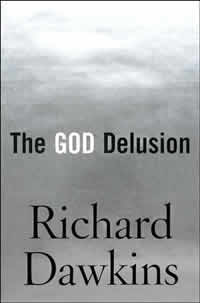Book Notes
 Richard Dawkins, The God Delusion (New York: Houghton Mifflin, 2006), 416pp.
Richard Dawkins, The God Delusion (New York: Houghton Mifflin, 2006), 416pp.
The following essay was written by Martin Marty. Copyright (2006) CHRISTIAN CENTURY. Reproduced by permission from the November 14, 2006 issue of the CHRISTIAN CENTURY. Subscriptions: $49/year from P.O. Box 378, Mt. Morris, IL 61054. 1-800-208-4097. For the original electronic version see http://www.christiancentury.org/dept_memo.lasso.
M.E.M.O.
Sneers
by Martin E. Marty
At a conference in Maine last month I was cast alongside Richard Dawkins, author of the best-selling The God Delusion. But we did not debate. We were on parallel paths and went in opposite directions.
His career and his book are devoted to opposing all religions and all manifestations of faith. He argues that humanity will truly be on the path to progress only after all traces of religion are expunged, and he calls on readers to join in the expunging.
My vocation is to do my doubting within the context of faith. My theme, whether a Dawkins is on stage or not, is to note that, around the world, faith-communities, religion and spiritual forces are growing in size and intensity. This is a phenomenon that has nothing to do with truth or falsehood, their goodness or evil. But the phenomenon does suggest that it is pointless to talk about and work on doing away with them. Energies are better spent observing the ways in which faith and faiths can heal, console, judge, offer interpretations of life and build communities that work for the common good.
The God Delusion, which is selling wildly, perhaps inspires those inclined to be antireligious to be really antireligious. But it has evoked devastating reviews by other scientists and philosophers, who recognize that while Dawkins is a distinguished scientist, he knows little about religion. Reviewers Terry Eagleton, Robert Nozick, Marilynne Robinson and Jim Holt have issued critiques in periodicals that are not known to be promoters of piety—such as the London Review of Books, New Republic, Harper's Magazine and the New York Times Book Review.
What to make of the popularity of antireligious books in religious America? Do they address overblown and undercriticized religious claims? Good. Do they flatter faith by taking it seriously? Good. Does intelligent criticism refine and quicken faith and faiths? Surely. But often in an America that craves entertainment and titillation, these critiques are mostly show biz.
Decades ago I wrote a book, The Infidel: Freethought and American Religion, in which I noted that freethinkers and atheists have offered a source of entertainment in a religiously complacent America. Ancestors of Dawkins like Robert Owen, Robert Ingersoll and H. L. Mencken drew crowds and sales in their times, always with show-biz effects. And then their pious critics thrilled audiences by responding—they would draw listeners to the edges of philosophical cliffs and then deliver them back to their churches.
Profound criticism challenges puffy religion. Perhaps. But in the case of The God Delusion, many reviewers responded the way William Paley did in the 19th century when he was faced with a truly great attack on faith, Edward Gibbons's The Decline and Fall of the Roman Empire. Paley's response: "Who can refute a sneer?"
Martin E. Marty is a Century contributing editor.


